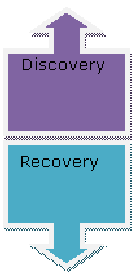 What happened in the past has a great effect on our present. We take our experiences from what happened to us and add them to the bank of beliefs, thoughts and attitudes in our life. Sometimes, we place too much importance on past events and allow them to stop us from getting on with life.
What happened in the past has a great effect on our present. We take our experiences from what happened to us and add them to the bank of beliefs, thoughts and attitudes in our life. Sometimes, we place too much importance on past events and allow them to stop us from getting on with life.
Unlike adults, children are not very impressed with what happened in the past. When they fall down, they do not say to themselves, “I am 1 year old and I can’t walk by myself, which means I will never be able to walk”. They simply get up and try again and again until they learn to walk. Kids try many more times grownups to do things that seem impossible.
Emotional intelligence research has found that this attitude of children is what drives them to keep moving forward. Naturally, they do not see unsuccessful events as permanent failures.
Think about it. If they did not have that attitude, they could not learn to walk, talk, eat, hold a spoon, get dressed, shower themselves, tie their shoelaces, read or ride a bike, because as soon as they stumbled once, they would think, “I can’t do this, so I shouldn’t try anymore”.
Unfortunately, that research also found that as they grow older, they try less and less until by the age of 17, when given a task that seems impossible, kids do not even try to do it.
The next irrational rule of living creeps into our life as we grow older:
Events in my past are the cause of my problems, and they continue to influence my feelings and behaviors now
Much pain and misery in the world is caused by people who believe that the past, being unchangeable, determines what happens to them and will continue to do so. They use the past to explain their identity (“I’m such a loser, I didn’t even finish high school”), their feelings (“I’m depressed, because my parents died when I was young”) and their abilities (“I’m uncomfortable with people, because I grew up on a farm”). They keep telling these stories to anyone who will listen, which only keeps them the same.
In the process of coaching, we free people from such belief totally. At first when people come, I explain to everyone about recovery and discovery.
Discovery or Recovery
There are two kinds of people – those in recovery and those in discovery.
People in recovery always look back. They think the answer to all their problems is in the past. They have wonderful excuses as to why they are in any situation they are not happy about.
People in recovery still have problems, but they always look forward, focus on getting better and do not complain about the past.
Here are the differences between Discoverers and Recoverers:
| Recoverers | Discoverers |
| Ask “Why does it happen to me?” | Ask “What I can do with what happen to me?” |
| Blame the past and others | Take responsibility |
| See a dark and difficult future | See a bright and easy future |
| Focus on what does not work | Focus on what works and what they want |
| Go over things in past again and again | Learn from things in the past and move on |
| Are full of fear | Are full of hope |
| Focus only on outcomes | Appreciate the process of moving forward |
| Procrastinate | Take action |
| Dream of changing the past | Accept that the past cannot be changed |
| Are motivated by pain | Are motivated by pleasure |
| Avoid taking risks | Understand that taking risks is part of life |
| Keep the past as part of their identity | Let go of the past and strengthen their identity |
Children get this rule from their closest social agents – parents, relatives, teachers and other grownup role models. As a parent, there are some things you can do to make sure your kids do not adopt this rule (and therefore will not need a life coach when he grows up).
What parents can do to help their kids let go of the past and look forward with hope
 Put this Serenity Prayer in places where your kids stand for 1 minute (to allow them to read). I put it in the toilet, at the entrance to my office, on my desk and on the bathroom mirror, so they can read it when they brush their teeth (by the way, they need to brush for 2 minutes, so they can read it twice)
Put this Serenity Prayer in places where your kids stand for 1 minute (to allow them to read). I put it in the toilet, at the entrance to my office, on my desk and on the bathroom mirror, so they can read it when they brush their teeth (by the way, they need to brush for 2 minutes, so they can read it twice)
God, grant me the
serenity to accept the things I cannot change,
courage to change the things I can, and the
wisdom to know the difference
I say it many times. If we can get most people to understand this, we will have many more happy people. If you laminate it, you can even put it in the shower or inside the refrigerator.
- When your kids blame the past for their problems, remind them that they have a choice to respond differently. We might not control what happens to us, but we can always control how we respond to it.
- If your kids say they are afraid of something, change their focus to “What will make you happy?” Getting more pleasure out of a situation is better focus than avoiding pain.
 When your kids use the phrase “but what if…” and try to guess many options about the future, remind them they are not fortunetellers. It is good to ask “what if”, but not as a procrastinating tool.
When your kids use the phrase “but what if…” and try to guess many options about the future, remind them they are not fortunetellers. It is good to ask “what if”, but not as a procrastinating tool.- Encourage your kids to try things – new food, new friends, a new hobby, a new approach or a new game. Tell them we can never find new things if we do not try. We can never find amazing tastes if we stick only to what we used to.
- Tell your kids that even uncomfortable things that happened to us in the past can be learning experiences if we ask, “What can I learn from this?” and move on. Emphasize moving on.
Tomorrow, I will cover the 11th irrational rule of living – Sympathy.
Until tomorrow, keep moving forward!
Ronit
This post is part of the series Irrational Rules of Living:
- Irrational Rules of Living – External Approval
- Irrational Rules of Living – Self Worth
- Irrational Rules of Living – Problem Solving
- Irrational Rules of Living – Right and Wrong
- Irrational Rules of Living – My Way or the Highway
- Irrational Rules of Living – Disempowerment
- Irrational Rules of Living – Anxiety
- Irrational Rules of Living – Avoidance
- Irrational Rules of Living – Dependency
- Irrational Rules of Living – The Power of the Past
- Irrational Rules of Living – Sympathy
- Irrational Rules of Living – Discomfort and pain

 Put this Serenity Prayer in places where your kids stand for 1 minute (to allow them to read). I put it in the toilet, at the entrance to my office, on my desk and on the bathroom mirror, so they can read it when they brush their teeth (by the way, they need to brush for 2 minutes, so they can read it twice)
Put this Serenity Prayer in places where your kids stand for 1 minute (to allow them to read). I put it in the toilet, at the entrance to my office, on my desk and on the bathroom mirror, so they can read it when they brush their teeth (by the way, they need to brush for 2 minutes, so they can read it twice) When your kids use the phrase “but what if…” and try to guess many options about the future, remind them they are not fortunetellers. It is good to ask “what if”, but not as a procrastinating tool.
When your kids use the phrase “but what if…” and try to guess many options about the future, remind them they are not fortunetellers. It is good to ask “what if”, but not as a procrastinating tool.










